AI is changing how people search, how answers are delivered, and how visibility works online. More users now start their searches with AI tools, Google’s AI Overviews appear in nearly half of all queries, and most searches end without a click to a website.
This report breaks down the latest AI SEO statistics, including user behavior, zero-click trends, AI-generated content, ranking impacts, brand visibility in AI answers, and how SEO teams are adapting.
It’s designed for anyone who relies on search visibility: business owners, growth teams, content creators, SEO specialists, and digital strategists.
We keep things up to date with fresh data every quarter. This is the Q1 2026 edition.
AI tools are becoming a common entry point for online searches, especially for research and quick answers. Younger users are leading this shift, while Google’s long-standing dominance is beginning to erode.
For SEO, this means visibility is no longer just about ranking pages. Now, it’s about becoming the source that AI systems summarize. Let’s look at the AI SEO statistics that prove this.
Users are increasingly turning to AI tools instead of traditional search engines to find information, especially for research and quick answers.
37% of consumers begin searches with AI tools instead of Google (Source). See core reasons below:
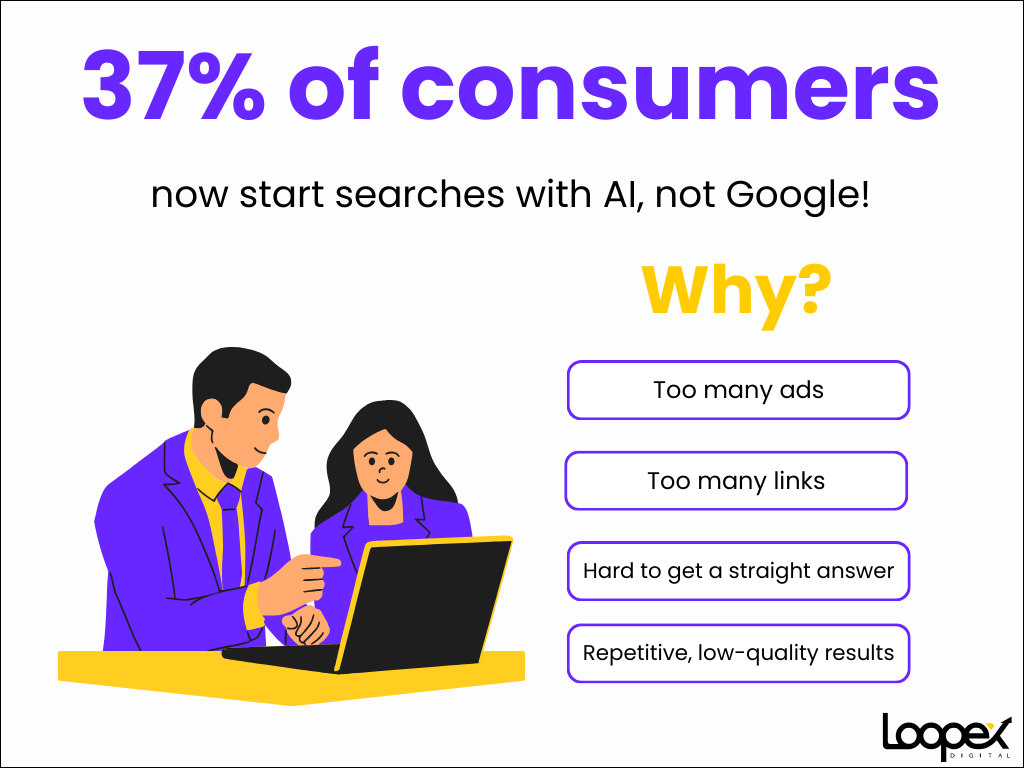
Many users now follow a hybrid approach: AI provides the initial answer, and users verify elsewhere.
This behavior matters for SEO because brands need to be both AI-visible and verification-ready on traditional search.
The main uses of AI search are (Source):
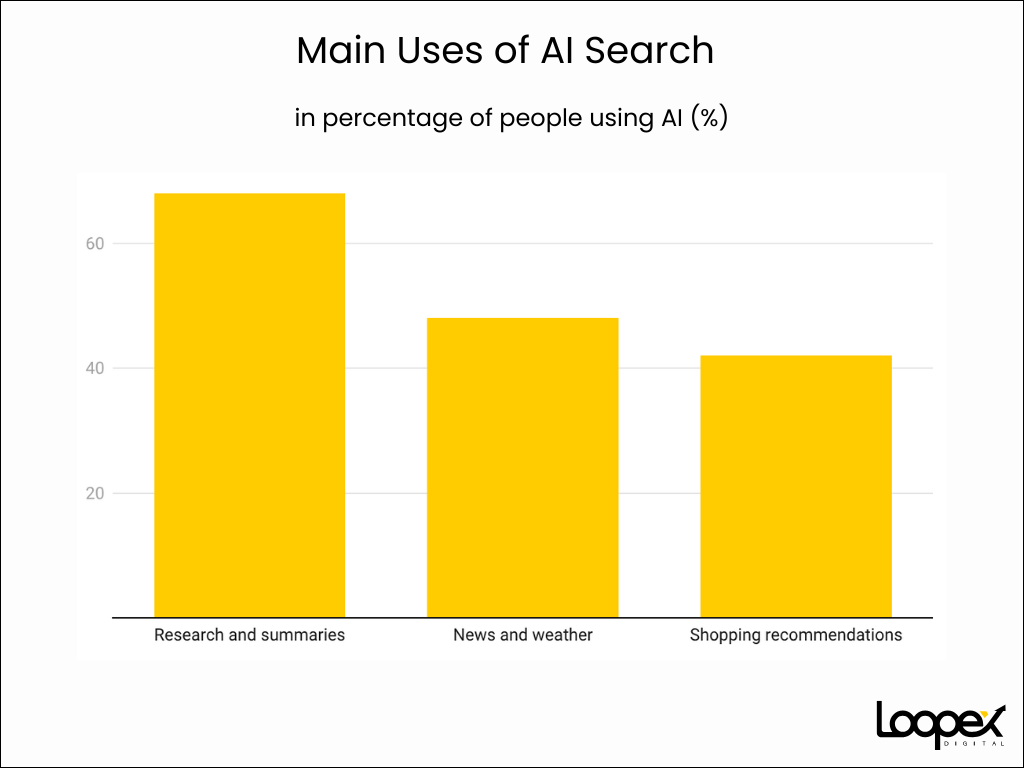
AI SEO statistics point to a long-term shift in how people find information. More users plan to rely on tools such as ChatGPT rather than traditional websites. At the same time, businesses are preparing for a future in which AI platforms become the primary discovery channel.
This dual adoption by users and companies is driving rapid growth in AI marketing and SEO tools.
AI is changing how people use search engines. Instead of clicking through multiple results, users increasingly rely on AI-generated answers directly on the results page.
This shift is reducing traditional search traffic and reshaping how visibility works for brands, publishers, and SEO teams.
These projections suggest fewer users will rely on traditional search results pages as their primary source of information.
AI Overviews now appear in nearly half of Google searches and reach billions of users worldwide.
This has accelerated zero-click behavior, where users get answers directly from the search results without visiting a website.
For many queries, the goal is no longer just to rank; it’s to become the source AI systems reference.
Zero-click searches are now the norm for many users.
These layouts leave limited space for organic listings, especially on smaller screens.
AI Overviews favor recent, fact-based, and topic-authoritative content.
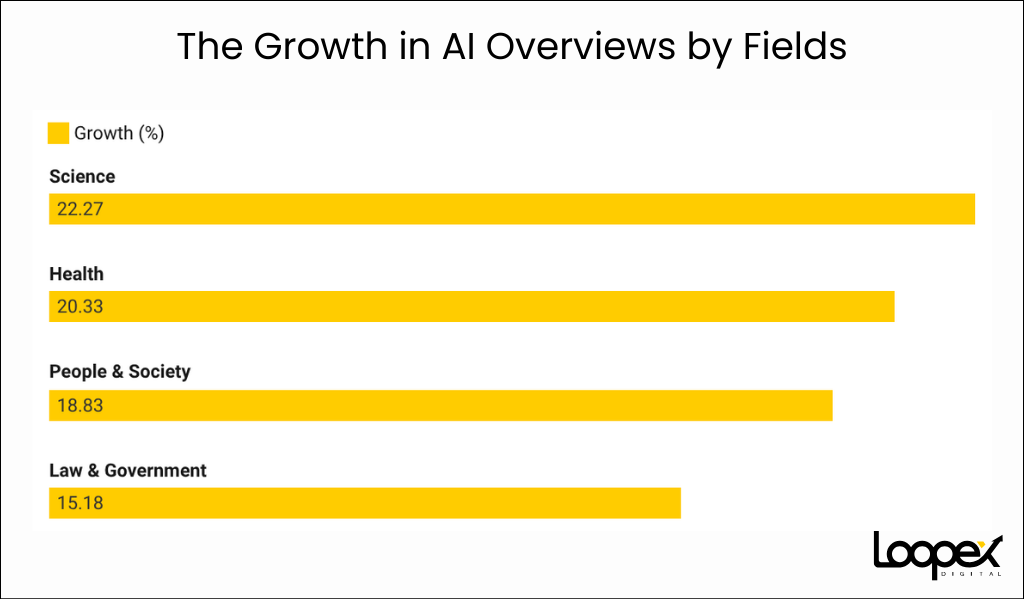
These shifts show how users are increasingly relying on AI for critical, information-heavy topics.
AI SEO statistics also highlight where specifically AI sends users:
This means even brand searches can surface rival content inside AI-generated answers.
AI is changing how traffic, attribution, and revenue work in search, but not in a single direction.
AI Overviews reduce organic clicks and send very little traffic to websites. At the same time, AI-powered tools help SEO teams work faster, improve performance, and increase ROI.
The result is a contradiction: AI limits traditional traffic, but improves how marketing teams operate.
For now, AI-driven search sends limited traffic and has little direct revenue impact.
While AI reduces clicks, it improves how SEO work gets done.

AI doesn’t drive traffic directly; it helps teams produce better-performing content.
The market behind AI-powered search is growing fast:
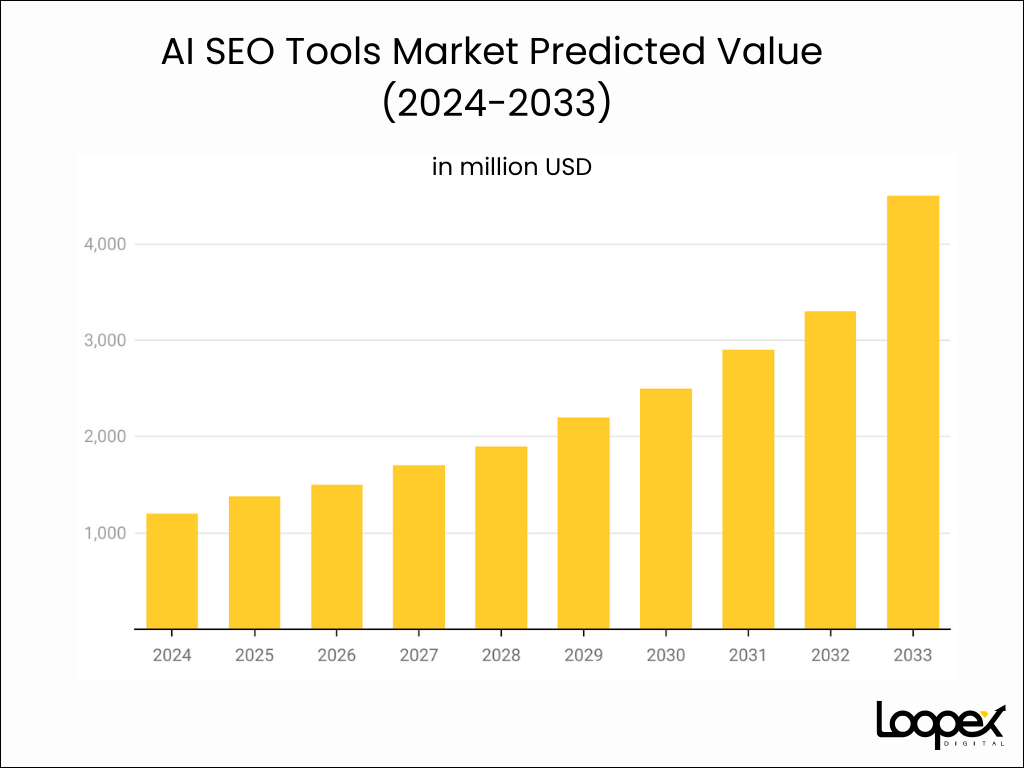
AI may not drive immediate conversions, but it plays a growing role in discovery, influence, and long-term revenue impact.
AI use in SEO has moved beyond experimentation. Most teams now rely on AI for research, content, and automation, while leadership increasingly expects clear strategies for visibility in AI-driven search.
Based on the latest AI SEO statistics, most teams use AI to work faster and target intent more accurately:
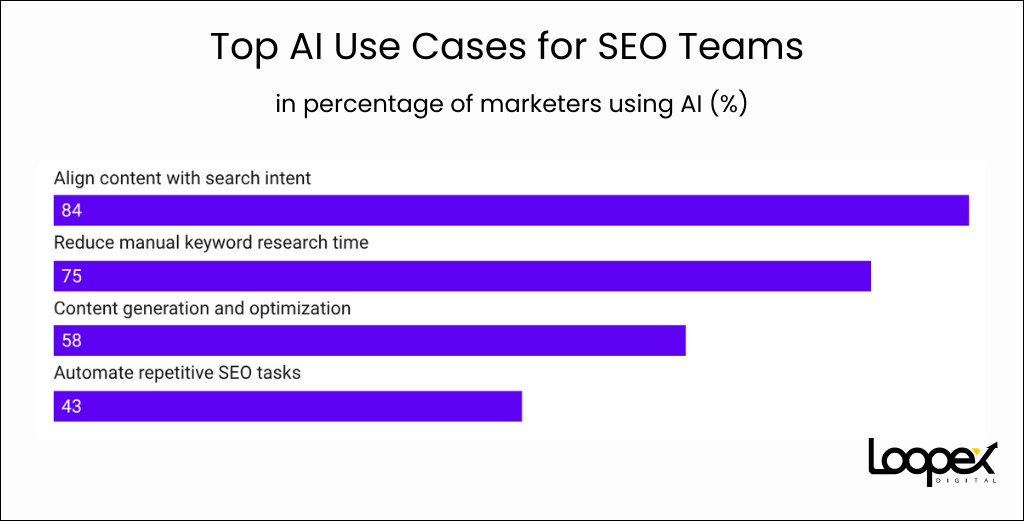
AI supports performance, but human review still matters, and leadership is paying attention.
Adoption is growing, but readiness is uneven. The main barrier isn’t technology; it’s knowledge.
AI-generated content is now a common part of the web. Most new pages include at least some AI-written text, and AI-assisted content appears frequently in top-ranking results.
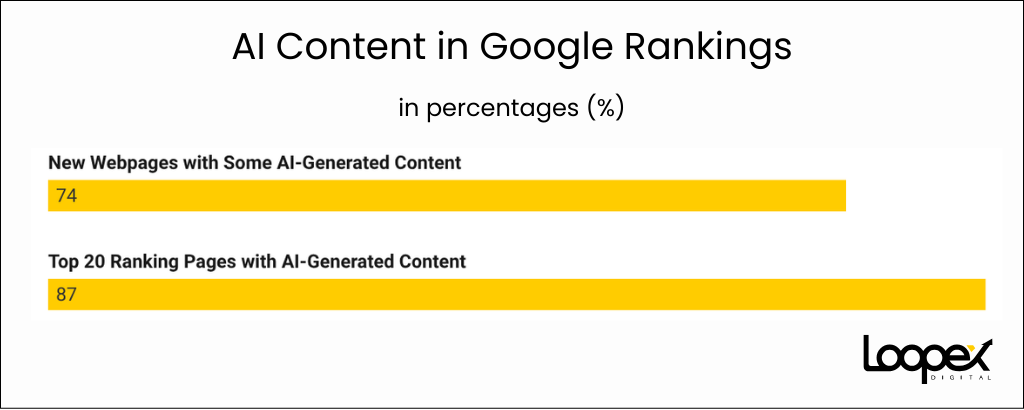
In 2026, AI is a part of standard content production across most industries.
Current data shows that Google does not penalize AI-assisted content by default. What matters is value, not authorship.
Google has an explicit policy against "scaled content abuse," and its systems evaluate:
So, AI in SEO works best when it supports human expertise.
AI Overviews consistently cite content that is easy to scan, mobile-friendly, and focused on answering specific questions directly.
AI draws from both high-ranking pages and niche sources, especially when the content clearly answers a specific question.
This shows that scannability matters more than length. Content that delivers quick, structured answers is more likely to be cited.
So, based on AI SEO statistics, AI-driven search prioritizes user intent, topic coverage, and clear answers.
User trust in AI-powered search remains mixed. Concerns about accuracy, transparency, and reliability continue to shape how people interact with AI-generated answers.
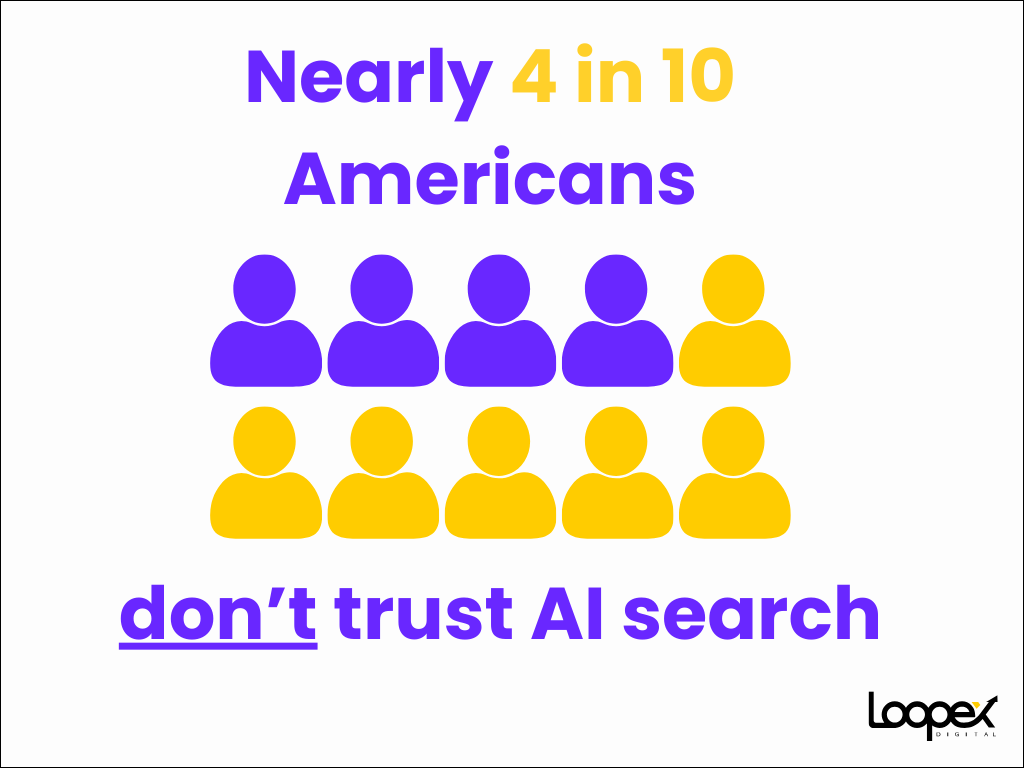
Trust remains fragile, especially when users feel unsure about where AI answers come from or how reliable they are.
People want to know when AI is involved. Clear labeling helps set expectations and protect credibility.
AI visibility now depends on whether a brand is cited when users ask for recommendations. To capture AI-driven demand, brands must be recognized as authoritative across multiple AI platforms.
AI platforms typically cite a limited set of brands per query.
Brand visibility differs by platform (Source):
A brand visible on one AI platform may not appear on another. Cross-platform visibility requires a consistent brand presence, supported by strong link building and digital PR.
AI-driven referrals remain a small share of total web traffic, but they’re growing.
Where AI referrals occur, they often bring higher-intent users (Source):
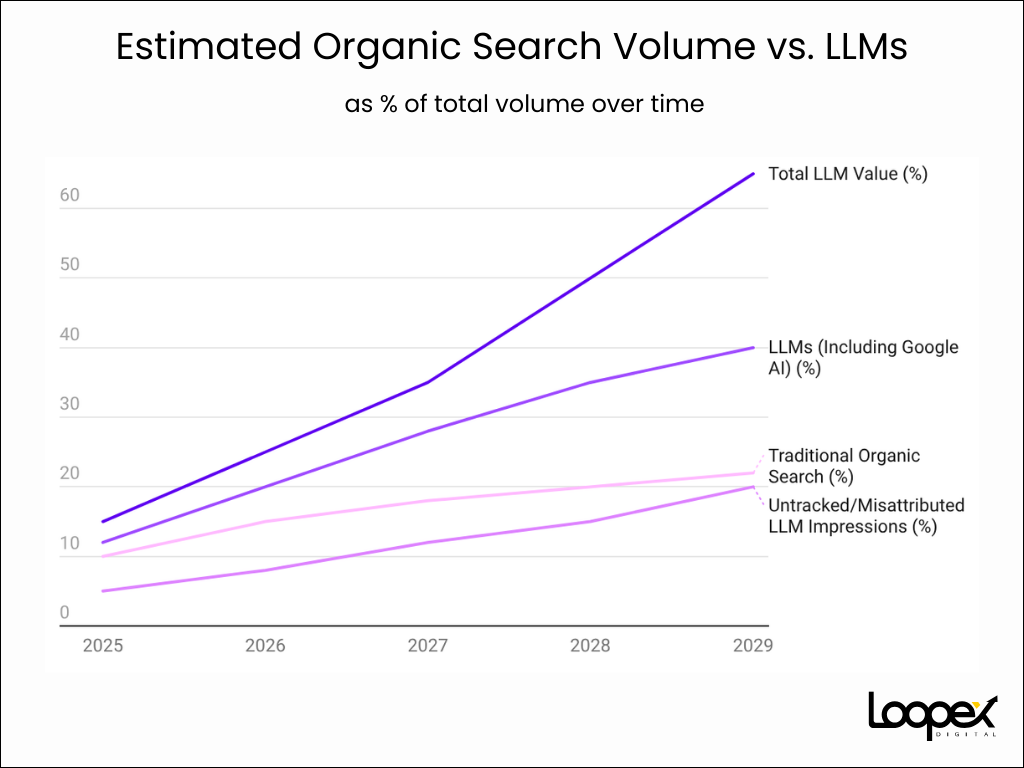
So, AI SEO visibility can drive higher-quality traffic.
Voice search is now a mainstream way people interact with search engines and digital devices. AI-powered assistants understand natural speech, deliver direct answers, and are widely used for local and everyday queries.
For SEO, this shifts the focus toward conversational content, structured answers, and featured snippet optimization.
Voice-enabled devices are everywhere, and a large share of users rely on voice regularly.
Modern voice search is powered by AI and natural language processing, so it works best with natural, question-based content and clear answers.
Voice search changes how content gets discovered (Source):
If your content doesn’t sound like a natural answer, voice assistants won’t surface it, even if you rank in traditional search. Here’s a checklist you can use:
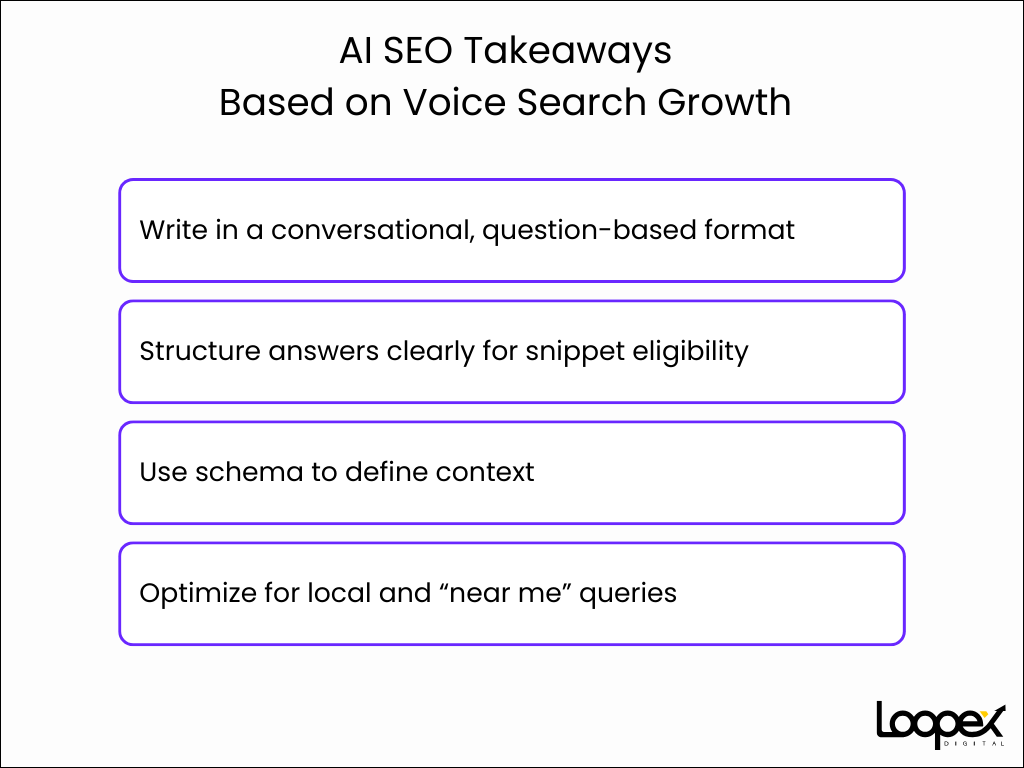
This report is based on publicly available data from trusted industry sources, including Gartner, McKinsey, BrightEdge, Semrush, Search Engine Land, Yaguara, DataReportal, and academic research partners.
We focused on recent datasets from Q4 2024 to 2026 and prioritized studies that measured real user behavior, search performance, AI platform activity, and SEO outcomes across multiple industries.
To avoid outdated or misleading insights, we cross-checked overlapping statistics and excluded figures that lacked transparent methodology or clear sourcing.
If AI search visibility matters to your business in 2026, here’s what to focus on:
If you need support improving your visibility in AI-driven search, our SEO team can help. We’ve helped hundreds of businesses adapt to these changes, and we can do the same for you. Just contact us!
Our blog covers a combination of industry trends and professional insights from behind-the-scenes experiences. We provide weekly updates on link building, content marketing, on-site and technical SEO, and more! Sign up for our newsletter and join our LinkedIn to be on top of industry trends!
Submit the form - Get Free Proposal
%202.png)
24 hours

Submit the form - Get Free Proposal
%202.png)
24 hours